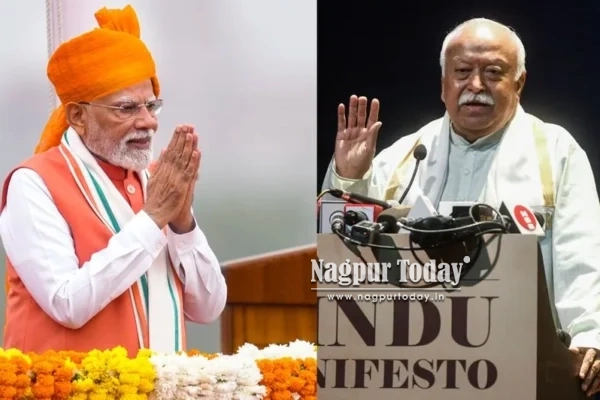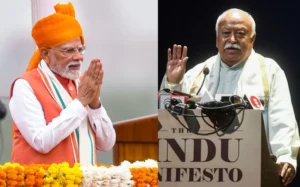
New Delhi: For the first time in 12 consecutive Independence Day addresses, Prime Minister Narendra Modi publicly praised the Rashtriya Swayamsevak Sangh (RSS) from the Red Fort, calling it “the world’s biggest NGO” and honouring its “100 years of disciplined national service.”
The rare mention, coinciding with the RSS’s centenary, is more than ceremonial. It comes after years of quiet strain in the BJP–RSS relationship and just ahead of high-stakes assembly polls in Bihar, and West Bengal — contests where the BJP’s fortunes may hinge on the Sangh’s formidable grassroots machinery.
A Relationship Once Under Strain
The RSS has been the BJP’s ideological mentor and organisational backbone for decades, but in recent years its role appeared diminished:
- Post-2024 Lok Sabha Results — BJP fell short of its target supermajority, with losses in core Hindi belt states. Analysts linked part of the setback to a less visible RSS presence on the ground.
- Centralised Campaigning — The BJP’s “Modi ki Guarantee” strategy sidelined the consultative model long favoured by the Sangh.
- Bhagwat’s Subtle Critiques — RSS chief Mohan Bhagwat has repeatedly urged humility and collective leadership, seen as indirect advice to the BJP’s top brass.
The Retirement Age Remark
Speculation about tensions spiked earlier this year when Bhagwat remarked that leaders should step aside at 75 to make way for younger talent. Both Modi and Bhagwat turn 75 in September 2025. The Opposition framed it as a signal aimed squarely at the Prime Minister, recalling how BJP veterans L.K. Advani and Murli Manohar Joshi were sidelined at that age. The RSS denied any such intent, but the political undertone lingered.
Why Now? Timing and Calculus
Modi’s public embrace of the RSS comes with clear political incentives:
- Maharashtra — The BJP–Shiv Sena (Shinde) alliance will rely heavily on RSS workers to counter the Maha Vikas Aghadi’s network.
- Bihar & Bengal — In states where BJP lacks deep local roots, the Sangh’s cadre is often the difference-maker in rural mobilisation.
- Centenary Optics — Linking the RSS’s 100-year service record to Modi’s “Viksit Bharat by 2047” vision reinforces a shared long-term national mission.
Reactions and Readings
- Sangh Circles — Senior RSS functionaries welcomed the recognition, noting it “restores public acknowledgment” at the highest level.
- Opposition — AIMIM chief Asaduddin Owaisi called the praise “an insult to the freedom struggle,” while Congress leaders questioned naming an ideologically affiliated group in a state address meant for all citizens.
- Political Analysts — View it as a “public handshake” to ensure RSS mobilisation in upcoming polls — a reminder that electoral strategy, not just sentiment, drives such symbolic gestures.
The Bigger Picture
The Independence Day mention signals a tactical reset: Modi is re-aligning with the Sangh after a phase of cool distance, recognising the organisation’s grassroots power as the BJP braces for tough state-level battles. Whether this public warmth turns into sustained organisational coordination will be tested in the coming months — but for now, the Red Fort has become the stage for a very public reconciliation.














